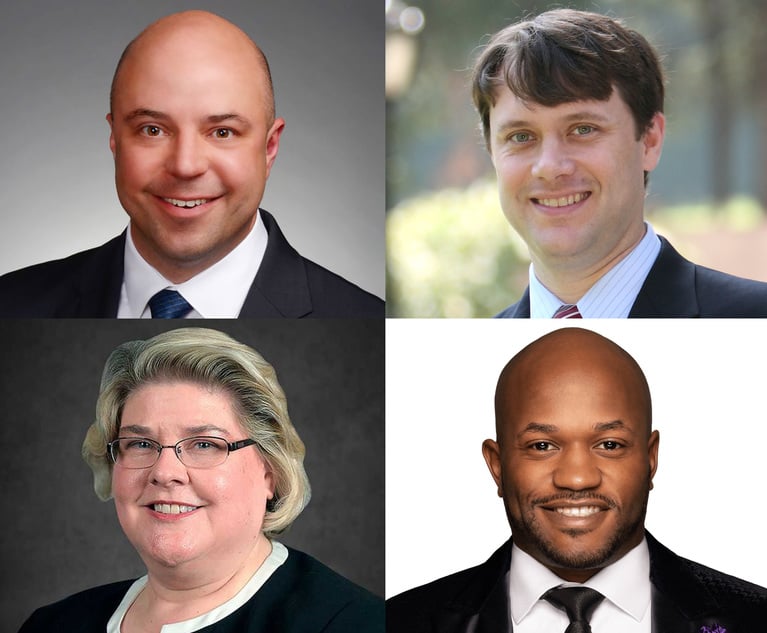 Judge Mike Brown, U.S. District Court for the Northern District of Georgia (Photo: John Disney/ALM)
Judge Mike Brown, U.S. District Court for the Northern District of Georgia (Photo: John Disney/ALM)US Judge in Atlanta Leads Nation in Motions Pending More Than Six Months
"I know the numbers aren't where Judge Brown wants them," said Jim Hatten, the chief clerk of the U.S. District Court for the Northern District of Georgia.
November 21, 2019 at 01:59 PM
5 minute read
Saddled with dozens of filings from before he joined the bench in January 2018, Judge Michael Brown is wrestling with deadlines from a federal law pushing judges to decide motions in civil cases within six months.
Brown had 177 undecided motions that had been pending more than six months, leading the federal judiciary's latest semiannual listing required by the Civil Justice Reform Act of 1990.
Sixty-two of those motions, or more than one-third of them, were filed before Brown started work on Jan. 17, 2018, after he was confirmed by a 92-0 vote of the U.S. Senate.
Brown did not respond to email and phone requests. The federal judicial listing cites "Voluminous Briefs/Transcripts To Be Read," "Complexity of Case" and heavy caseloads as reasons he cited for the delays.
"I know the numbers aren't where Judge Brown wants them," said Jim Hatten, chief clerk of the U.S. District Court for the Northern District of Georgia.
"He's not losing ground," added Hatten, noting that Brown has about 350 civil cases pending from among the roughly 1,000 he has been assigned since arriving.
Hatten noted that each new judge receives a civil caseload of about 300 cases pulled at random from other judges' dockets. "There's a learning curve" for new judges, he added, which varies depending on each judge's past experience.
Some federal judges come from the other bench posts, so they may be more familiar with a range of cases and the mechanics of case management. Brown served as a federal prosecutor and then as co-leader of Alston & Bird's government and internal investigations practice before becoming a judge, so he likely spent far more time on criminal law than civil matters.
Chief Judge Thomas Thrash declined to comment on the listings.
The numbers from the Administrative Office of the U.S. Courts reflect civil caseloads as of March 31; they were released to the public on Oct. 27.
The federal listing for September 2018—released the following March—said Brown had 145 motions that were beyond the six-month mark. Hatten predicted Brown's numbers may not improve until after the next release, which will cover caseloads at the end of September.
"It takes judges some time" before reaching peak efficiency, he said. "Their initial focus is to make the right decision."
Five other federal judges—one from California, two from New York, one from Texas and one from the U.S. Virgin Islands—were listed as having more than 100 motions pending for more than six months. Their totals ranged from 115 to 156.
Eleven judges around the country had 50 or more motions pending more than six months.
In the Northern District of Georgia, four other judges among the court's 26 full-time district court judges, senior judges and magistrate judges were listed as holding longtime motions. They are U.S. District Judge Eleanor Ross (19), Senior Judge Clarence Cooper (17), District Judge Amy Totenberg (15) and Senior Judge Richard Story (6.) They declined to comment, according to Hatten.
In October 2016, the federal judicial report listed 255 civil cases older than three years and 24 civil motions that had been pending for more than six months in the Northern District, which is headquartered in Atlanta with satellite courthouses in Gainesville, Rome and Newnan.
By June 2017, the judges had disposed of all but seven of those cases and issued rulings on 15 motions listed in the report as older than six months.
Thrash told the Daily Report in 2017 that many of the older, complex civil cases were being cleared because the Senate had finally confirmed nominees to fill vacancies on the court.
In September of this year, the Senate confirmed Steven Grimberg to join the Northern District bench, giving the court a full complement of judges—11 active judges, along with five senior judges.
This content has been archived. It is available through our partners, LexisNexis® and Bloomberg Law.
To view this content, please continue to their sites.
Not a Lexis Subscriber?
Subscribe Now
Not a Bloomberg Law Subscriber?
Subscribe Now
NOT FOR REPRINT
© 2024 ALM Global, LLC, All Rights Reserved. Request academic re-use from www.copyright.com. All other uses, submit a request to [email protected]. For more information visit Asset & Logo Licensing.
You Might Like
View All

Who Got the Work: 16 Lawyers Appointed to BioLab Class Action Litigation
4 minute read

'Possible Harm'?: Winston & Strawn Will Appeal Unfavorable Ruling in NASCAR Antitrust Lawsuit
3 minute readTrending Stories
- 1Appellate Div. Follows Fed Reasoning on Recusal for Legislator-Turned-Judge
- 2SEC Obtained Record $8.2 Billion in Financial Remedies for Fiscal Year 2024, Commission Says
- 3Judiciary Law §487 in 2024
- 4Polsinelli's Revenue and Profits Surge Amid Partner De-Equitizations, Retirements
- 5Environmental Fines: Texas Secures Over $100M From Petrochemical Processor TPC Group
Who Got The Work
Michael G. Bongiorno, Andrew Scott Dulberg and Elizabeth E. Driscoll from Wilmer Cutler Pickering Hale and Dorr have stepped in to represent Symbotic Inc., an A.I.-enabled technology platform that focuses on increasing supply chain efficiency, and other defendants in a pending shareholder derivative lawsuit. The case, filed Oct. 2 in Massachusetts District Court by the Brown Law Firm on behalf of Stephen Austen, accuses certain officers and directors of misleading investors in regard to Symbotic's potential for margin growth by failing to disclose that the company was not equipped to timely deploy its systems or manage expenses through project delays. The case, assigned to U.S. District Judge Nathaniel M. Gorton, is 1:24-cv-12522, Austen v. Cohen et al.
Who Got The Work
Edmund Polubinski and Marie Killmond of Davis Polk & Wardwell have entered appearances for data platform software development company MongoDB and other defendants in a pending shareholder derivative lawsuit. The action, filed Oct. 7 in New York Southern District Court by the Brown Law Firm, accuses the company's directors and/or officers of falsely expressing confidence in the company’s restructuring of its sales incentive plan and downplaying the severity of decreases in its upfront commitments. The case is 1:24-cv-07594, Roy v. Ittycheria et al.
Who Got The Work
Amy O. Bruchs and Kurt F. Ellison of Michael Best & Friedrich have entered appearances for Epic Systems Corp. in a pending employment discrimination lawsuit. The suit was filed Sept. 7 in Wisconsin Western District Court by Levine Eisberner LLC and Siri & Glimstad on behalf of a project manager who claims that he was wrongfully terminated after applying for a religious exemption to the defendant's COVID-19 vaccine mandate. The case, assigned to U.S. Magistrate Judge Anita Marie Boor, is 3:24-cv-00630, Secker, Nathan v. Epic Systems Corporation.
Who Got The Work
David X. Sullivan, Thomas J. Finn and Gregory A. Hall from McCarter & English have entered appearances for Sunrun Installation Services in a pending civil rights lawsuit. The complaint was filed Sept. 4 in Connecticut District Court by attorney Robert M. Berke on behalf of former employee George Edward Steins, who was arrested and charged with employing an unregistered home improvement salesperson. The complaint alleges that had Sunrun informed the Connecticut Department of Consumer Protection that the plaintiff's employment had ended in 2017 and that he no longer held Sunrun's home improvement contractor license, he would not have been hit with charges, which were dismissed in May 2024. The case, assigned to U.S. District Judge Jeffrey A. Meyer, is 3:24-cv-01423, Steins v. Sunrun, Inc. et al.
Who Got The Work
Greenberg Traurig shareholder Joshua L. Raskin has entered an appearance for boohoo.com UK Ltd. in a pending patent infringement lawsuit. The suit, filed Sept. 3 in Texas Eastern District Court by Rozier Hardt McDonough on behalf of Alto Dynamics, asserts five patents related to an online shopping platform. The case, assigned to U.S. District Judge Rodney Gilstrap, is 2:24-cv-00719, Alto Dynamics, LLC v. boohoo.com UK Limited.
Featured Firms
Law Offices of Gary Martin Hays & Associates, P.C.
(470) 294-1674
Law Offices of Mark E. Salomone
(857) 444-6468
Smith & Hassler
(713) 739-1250






